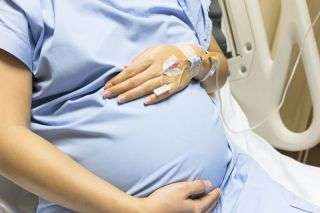
Pregnancy may increase the risk of severe COVID-19, a new study suggests.
Pregnant women were more likely to require admission to the intensive care unit (ICU) or use of a ventilator, compared with people who weren’t pregnant. However, pregnant women don’t appear to be at increased risk of death from the disease compared with nonpregnant women, according to the study, from the Centers for Disease Control and Prevention (CDC).
Previously, the CDC had said there was “no data showing that COVID-19 affects pregnant people differently than others,” but the new findings have led the agency to update its messaging on COVID-19 in pregnancy. The agency now says that “pregnant people might be at an increased risk for severe illness from COVID-19 compared to non-pregnant people.”
The new study — one of the largest on COVID-19 in pregnancy to date — analyzed information from more than 8,200 pregnant women and 83,200 nonpregnant women in the U.S. ages 15 to 44 who tested positive for COVID-19 between January and June.
The study found that nearly one-third of pregnant women with COVID-19 were hospitalized, compared with just six percent of nonpregnant women. But critically, the study could not distinguish between pregnant women who were hospitalized for delivery or other pregnancy-related procedures, from those who were hospitalized for issues specifically related to COVID-19. (In addition, the authors also noted that doctors may have a lower threshold for hospitalizing pregnant patients.) In other words, being hospitalized in this case does not necessarily indicate severe COVID-19 illness.
But the study also found that pregnant women with COVID-19 were more likely to be admitted to the ICU and require mechanical ventilation, compared with nonpregnant women. Specifically, 1.5% of pregnant women were admitted to the ICU, compared with 0.9% of nonpregnant women; and 0.5% of pregnant women required mechanical ventilation, compared with 0.3% of nonpregnant women. Both ICU admission and need for a ventilator are “distinct proxies for illness severity” for COVID-19, the authors said.
The risk of death from COVID-19 was the same for pregnant and nonpregnant women — the fatality rate in both groups was 0.2%.
“There’s a good news bad news picture here,” Dr. Dana Meaney-Delman, a COVID-19 deputy incident manager with the CDC, said at a new briefing on Thursday (June 25). The good news is that pregnant women don’t seem more likely to die of COVID-19, but the bad news is that they do have a higher risk of ICU admissions and need for mechanical ventilation, she said.
It’s very important to get the message out that pregnant women need to take precautions to protect themselves from COVID-19, Meaney-Delman said.
Still, the new study had some limitations — namely that a lot of data was missing. For example, for many women in both groups, doctors did not report whether they needed ICU admission, required a ventilator, or died. So those outcomes could have been more common (in one or both groups) than the study estimated.
In addition, the study couldn’t address how COVID-19 infection risk varied in specific trimesters or whether it affects outcomes for babies. The authors call for more complete data on the topic to fully understand the risk of COVID-19 for pregnant women.
Still, there’s enough data to inform pregnant women of their potential for severe illness from COVID-19, the authors said.
During the pandemic, the CDC recommends that pregnant women limit interactions with other people as much as possible, and when they do interact with others, to take precautions such as maintaining a 6-foot (1.8 meters) distance from others and wearing a face covering. Pregnant women should also attend prenatal care appointments and make sure they have at least a 30-day supply of any medicines they take.
Sourse: www.livescience.com





